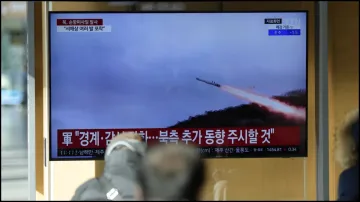South Korea accuses North of firing cruise missiles into waters near western coast
South Korea's defence minister Shin Won-sik condemned the launches and warned that Kim Jong Un's regime would meet its demise in case of a war. North Korea has accelerated its weapons development and nuclear threats toward growing cooperation between the US and its Asian allies.

Seoul: In another sign of deteriorating intra-Korean relations, South Korea on Wednesday accused the North of firing several cruise missiles off its western coast, shortly after an analysis of commercial satellite images showed that Pyongyang tore down a huge arch in the capital that symbolised reconciliation with its arch-rival. South Korea's Joint Chiefs of Staff said the missiles were fired in the morning and were being by South Korean and US intelligence.
South Korea's defence minister Shin Won-sik condemned the launches as a serious threat to his country. Speaking during his visit to the 17th Fighter Wing, an F-35 stealth fighter unit, Shin warned that the North Korean leader's regime would face its "demise" if it started a war. Notably, UN Security Council sanctions targeting the weapons development of North Korea do not bar the testing of conventionally armed cruise missiles.
"If Kim Jong Un makes the worst choice and starts a war, you as an invisible force that protects South Korea should become the vanguard in removing the leadership of the enemy as soon as possible," Shin said. The firing of missiles came after the South Korean Navy's special warfare unit was taking part in training along the east coast in Gangwon Province bordering the North for ten days.
The training was aimed at strengthening operational readiness following North Korea's recent artillery firing near a disputed maritime border and weapons tests, the JCS said. Pyongyang had earlier tested a solid-fuel hypersonic missile with an intermediate range that was condemned by the United States, South Korea and Japan. This came after North Korean leader Kim Jong Un vowed to name Seoul as a "primary foe" and rejected any hopes of reunification.
Intra-Korean relations at an all-time low
Tensions on the Korean Peninsula have increased in recent months as Kim continues to accelerate his weapons development and issue provocative threats of nuclear conflict with the United States and its Asian allies. North Korea has also demolished a major monument in Pyongyang that symbolised the goal of reconciliation with South Korea on Kim's orders.
Pyongyang's Monument to the Three Charters for National Reunification, which was also commonly called the Arch of Reunification, appeared gone in satellite images taken by Planet Labs on Tuesday morning, although it was not clear how or when it was taken down. It was a 100-foot structure that looked over a highway leading to the city of Kaesong near the border with South Korea.
Last week, North Korea conducted a test of its underwater nuclear attack drone in response to joint military drills between the United States, South Korea and Japan. The alleged drone test came amid heightened tensions Kim declared he would scrap his country’s long-standing goal of a peaceful unification with South Korea and that his country would rewrite its constitution to define South Korea as its most hostile foreign adversary.
The ministry's unnamed spokesman accused the United States, South Korea and Japan of "getting frantic" with military exercises and warned of "catastrophic consequences". The three countries' navies held their three-day regular drills until Wednesday, alongside the US aircraft carrier Carl Vinson, as part of efforts to improve their responses to Pyongyang's nuclear and missile threats.
Earlier, North Korea moved to abolish key government organisations managing relations with South Korea, as leader Kim Jong Un has made it clear that diplomacy and reunification with its rival is no longer possible in the wake of an expanded partnership between Seoul and Washington.
The North Korean Parliament said the two Koreas were locked in an "acute confrontation" and it is no longer tenable to hold the South as a partner in diplomacy. "The Committee for the Peaceful Reunification of the Country, the National Economic Cooperation Bureau and the (Mount Kumgang) International Tourism Administration, tools which existed for (North-South) dialogue, negotiations and cooperation, are abolished,” the assembly said.
Border agreement in peril
Earlier this year, in what seems like another point of deteriorating relations, South Korea accused North Korea of firing artillery rounds near its disputed sea border on Friday in violation of a fragile 2018 agreement. Seoul has reported several such drills since then.
The North Korean artillery shells all landed on the northern side of the disputed Northern Limit Line (NLL) maritime border, said spokesperson Lee Sung-joon, adding that the South Korean military has been monitoring Pyongyang's moves along its shores. The drills are the first to occur in over a year and is expected to deepen the already serious animosity between the two neighbouring countries.
The Koreas' sea boundary has been the site of several bloody inter-Korean sea battles since 1999. The North's alleged torpedoing of a South Korean warship killed 46 South Korean sailors in March 2010. In November that year, North Korean artillery fired scores of rounds at Yeonpyeong island, killing four people, including two civilians, in one of the heaviest attacks on its neighbour since the Korean War ended in 1953.
The 2018 agreement requires the two Koreas to halt live-fire exercises and aerial surveillance in no-fly and buffer zones that they established along their border. However, the deal is in danger of collapsing after the two Koreas began bickering since the North's first military spy satellite launch in November.
(with inputs from agencies)
ALSO READ | Putin to visit North Korea soon despite concerns raised by West over alleged arms deal